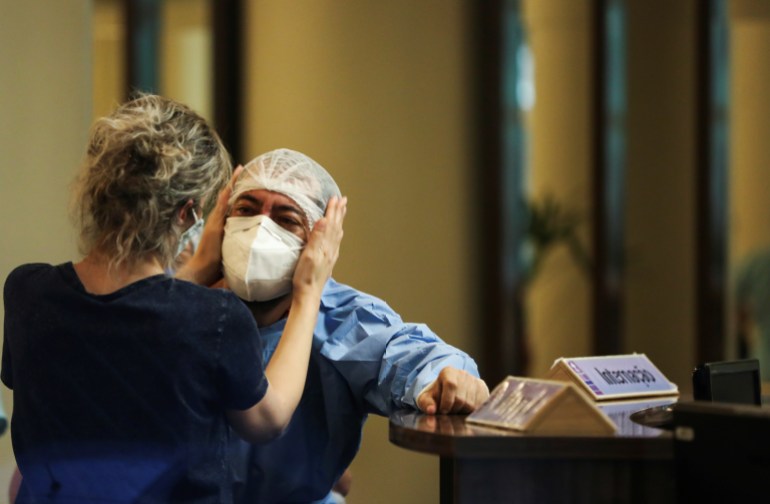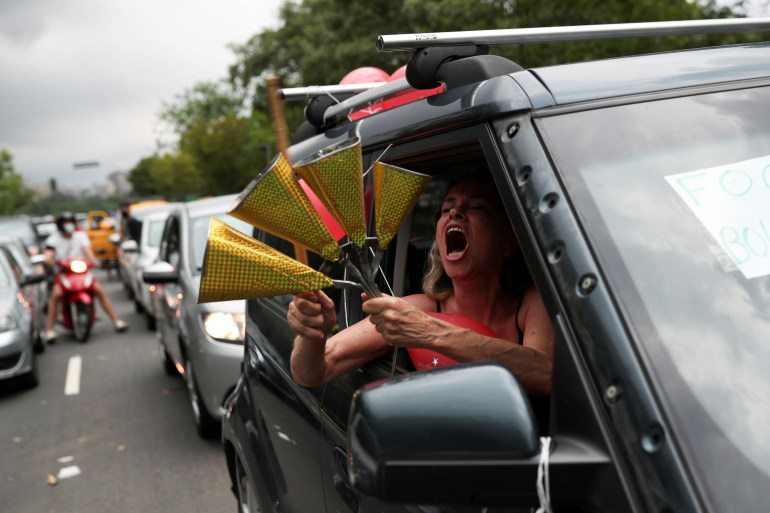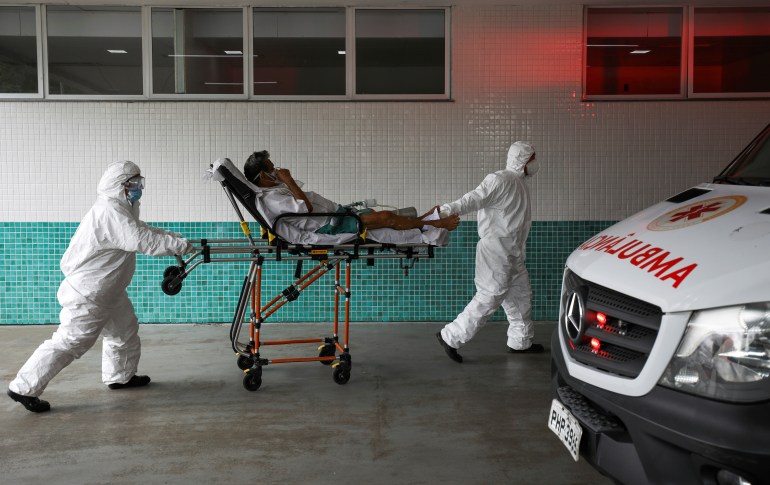Manaus COVID-19 crisis could strike across Brazil, doctors warn
Health system in Amazonas state capital is overrun by COVID-19 and experts say other regions could face a similar catastrophe.

With hospitals overrun and supplies of oxygen running out, Brazilian epidemiologist Jesem Orellana said COVID-19 patients’ hospital beds in Manaus, the capital of the country’s Amazonas region, turned into “asphyxiation chambers”.
“Manaus is lost,” said Orellana, who described the city as an open-air laboratory “where all types of negligence and inhumanity are possible” and in which people are dying at home with no medical support.
Keep reading
list of 3 itemsBrazil airlifts emergency oxygen to Manaus amid COVID surge
Brazil: COVID-hit Amazonas state receives more emergency supplies
He warned that the collapse of the local healthcare system, propelled in part by the discovery of a potentially more contagious variant of COVID-19 in the region, could happen in other parts of Brazil, too.
“It is not only possible that it will happen, it is already happening,” Orellana, who works at Fiocruz Amazonia, a public health research centre in Manaus, told Al Jazeera.
“There are people in the state of Para who have died from a lack of oxygen. When you start getting low on oxygen supplies, you start having problems with increased demand for hospital beds and that could have a domino effect.”
At least 216,000 dead countrywide
Brazil has recorded more than 216,000 deaths linked to COVID-19 since the start of the pandemic, the second highest total in the world after the United States, according to Johns Hopkins University data. It has also reported at least 8.8 million cases.
The federal government’s lack of a cohesive plan to rein in the pandemic or people’s behaviour has riled medical professionals.
Right-wing President Jair Bolsonaro has minimised the gravity of the virus, refused to receive the vaccine, and criticised lockdown and social-distancing orders issued by local government officials.
On January 15, Bolsonaro said the government had done what it could in Manaus. “The problem is terrible there. Now, we have done our part,” he said. But the attorney-general’s office has said the ministry of health ministry was allegedly warned nearly a week before oxygen stock reached critical levels in the city, but failed to inform federal authorities.

Orellana said while oxygen supplies have drawn international headlines, the real problem has been “a failure of government management and logistics”.
He called on international agencies such as the World Health Organization to act as observers in Manaus, “because it is no longer possible to trust the different levels of management leading the pandemic”.
New variant
Despite a steep rise in cases, many in Manaus still flew to Sao Paulo and Rio de Janeiro, said local obstetrician, Dr Alexandre Staviack, who added that the virus has reached small towns and could overwhelm their hospital systems.
COVID-19 infections surged by 125 percent in Manaus between January 7 and January 22, according to the National Council of Health Secretaries and Brazilian media.
Staviack said doctors have noticed an increase in the number of premature births in Manaus, as pregnant women with COVID-19 had to have caesareans due to their low oxygen levels. The threat of COVID-19 also propelled some pregnant women to take drastic steps, he said.
“They’re afraid. They avoid going to the hospital except if they’ve gone into labour.”
Meanwhile, concerns are growing that the new variant of COVID-19 found in Amazonas could easily spread, especially to parts of the country where healthcare access is limited.
The United Kingdom has banned arrivals from Brazil and other South American countries over concerns about the new variant, known as P1, which was first detected in travellers from Amazonas state going to Japan.
Dr Fabio Tozzi, a visiting professor at the Federal University of Western Para’s School of Public Health who has volunteered on a hospital boat for the last 15 years, said the pandemic exposed how bad Brazil’s health system is in isolated areas.
He said residents of isolated Amazonas communities typically travel by boat from across the state to Manaus when they are very sick due to a lack of critical care units. “All logistics around the river is by boat, but that’s making the transmission of the virus that much easier,” he said.
Dr Ricardo Affonso Ferreira is president of Expedicionarios da Saude (EDS), a group of volunteer doctors that travels regularly into the Amazon jungle to provide healthcare for Indigenous people there.
Since the start of the pandemic, he has been in charge of logistics in the Amazon region, coordinating challenging tasks such as the transportation of oxygen concentrators and cylinders to isolated communities.

Ferreira said doctors working in the area reported that the variant is spreading and this time more young people aged 30 to 50 are falling sick with more severe symptoms. “The virus will spread to other states such as Rondonia and those in the northeast of Brazil – they could suffer from a lack of oxygen as they are so poor,” Ferreira said.
He said the virus is already spreading up the Madeira River that runs through Bolivia.
“We are very, very scared about that,” said Ferreira, adding that Brazilian MP Cassio Espirito Santo recently said people from Peru and Bolivia also were coming to Tabatinga, in western Amazonas state, to be treated.
Lockdown to begin
Dr Julio Ponce, an epidemiologist who works in Sao Paulo, said last week that while deaths from the disease are under-reported, the latest data showed a seven-day daily average of 54,000 new cases and 983 deaths countrywide.
“Manaus serves as a sentinel for the rest of the country,” said Ponce, explaining that in April last year it was the first city in Brazil to experience a peak that led to the collapse of its healthcare system, followed by Para and other states in the country’s northeast.
“The same pattern will emerge this time, but with far worse outcomes,” said Ponce, who added that the new variant accounts for 42 percent of new cases in Manaus.
“All of the states and hospitals are fighting for a limited supply of oxygen. Other states besides Amazonas could run out if we don’t have a coordinated effort by the federal government. We are running out, state by state.”

Over the weekend, the governor of Amazonas state announced new restrictions would come into effect on January 25. Residents will only be allowed to go out for essential services, such as groceries or healthcare, for a period of seven days, said Wilson Lima.
The move comes after the state earlier imposed an overnight curfew, from 7pm to 6am.
In an open letter on Friday, Orellana had urged authorities to institute a 21-day lockdown in Manaus – which he called “the world capital of COVID-19” – to avert catastrophe. He said while the first wave in Manaus was traumatising, the second is worse – and it is leaving lasting scars.
A local ambulance driver recently had to transport four people to hospital, but all the patients died en route, Orellana recounted.
“He wasn’t able to sleep for two nights straight because he kept hearing the whispers of the dying people. He had to take leave and get psychiatric help,” Orellana said. “The rule seems to be to let the virus run free, horrifying all humanity.”